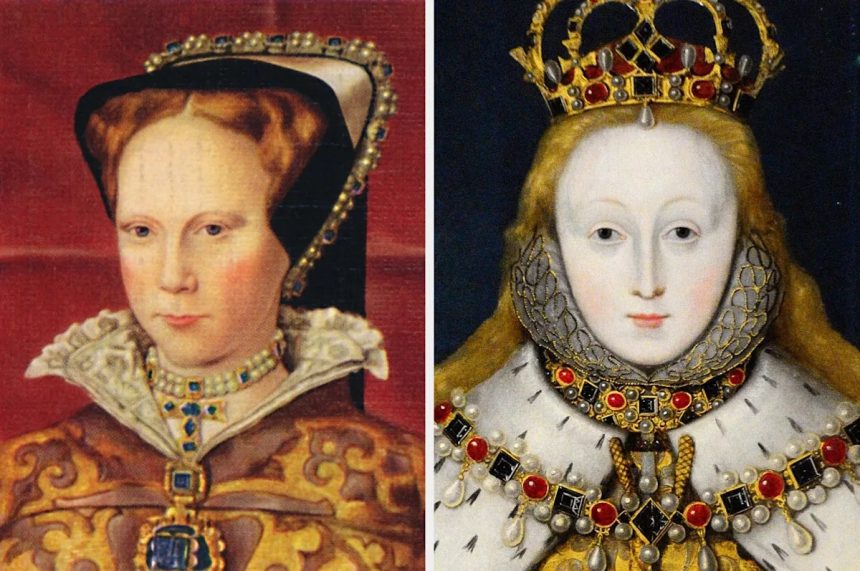Even in the 21st century, when it feels like it’s so easy to fact-check with just a quick Google, historical myths still spread like wildfire. They can be pretty juicy, it’s true — but in my opinion, the truth is always far more interesting! So, here are 10 historical myths, mistruths, or outright lies that you may or may not have heard, believe, or have even unknowingly spread. Enjoy!
1. Julius Caesar didn’t really say “Et tu, Brute?” during his assassination.
In Shakespeare’s Julius Caesar, Caesar’s phrase “Et tu, Brute?” refers to Marcus Junius Brutus, a historic Roman senator and Caesar’s one-time friend. But that phrase doesn’t show up in history until the writing of the play; as the senators fall upon and stab the eponymous Caesar, he cries out, “Et tu, Brute! Then fall, Caesar!”
No historic source has recorded these as being Caesar’s last words. Rather, it’s believed that Caesar exclaimed in Greek, “καὶ σύ, τέκνον,” — “kaì sý, téknon” — which translates to, “and you, my child?” which could either refer fondly to a younger man or to an actual son.
2. Contrary to what some believe, Queen Elizabeth I wasn’t England’s first queen. In reality, the first queen to rule the country in her own right was Mary I, Elizabeth’s older sister. However…

Print Collector / Getty Images
The even juicier truth is that although Mary was England’s first official queen, its first female ruler, Empress Matilda, predates her reign by about 400 years — and almost no one knows who she is.

Print Collector / Getty Images
Matilda, the only daughter of Henry I of England, gained the title of Empress when she was married to Henry V, the Holy Roman Emperor. Her husband died when Matilda was only 23, whereupon Matilda returned to her father’s side, but she continued to use the title of Empress until her own death.
When she was 24, King Henry had his court swear an oath to defend Matilda as his heir. When he died, her cousin Stephen of Blois betrayed his oath, and together with his brother (also named Henry), forced the archbishop of Canterbury to annoint him King.
Lucky for Matilda, she had the support of her half-brother Robert, Earl of Gloucester, and they endeavored to seize England by force. In 1139, Stephen was captured and Matilda gained the support of his aforementioned brother Henry, who garnered support for her on behalf of the church.
Matilda held power, but was never crowned Queen, as others in power feared that she hadn’t garnered the support of the people of London. Instead, the clergy gave her the title of Lady of the English.
Later, it was Matilda’s son, Henry, who succeeded Stephen to the throne, marking the beginning of the Plantagenet dynasty.
3. Many people know that the Pilgrims of Massachusetts were not the first Europeans to establish a colony in North America. Their 1620 landing is predated by the 1607 establishment of the infamous Jamestown Colony in Virginia. But Jamestown was actually not the first Old World settlement in what’s now the US; that title belongs to St. Augustine, Florida, which is still the oldest city in the US today.

Vladone / Getty Images
St. Augustine was founded in 1565 by Spanish explorer Pedro Menéndez de Avilés.
In what became known as the original Underground Railroad, the city became a sanctuary for escaped enslaved people fleeing the English colonies. After making the perilous journey (often with help from Native Americans), former slaves would live freely in St. Augustine…with the stipulation that they must convert to Catholicism and swear allegiance to the King of Spain.
Related: Older People Are Spilling The Details On Almost Every Facet Of Life, And I Can’t Stop Reading
4. The phrase “let them eat cake” was never “let them eat cake,” it was “let them eat brioche.” (Way more French.) Also, Marie Antoinette never said it!

Universal History Archive / Getty Images
The phrase “Qu’ils mangent de la brioche” originated in Rousseau’s Confessions, which was written in about 1767, when Marie Antoinette was a child in Austria.
5. During the Salem witch tirals, not one person was burned at the stake.

Universal History Archive / Getty Images
The Salem witch trials of the 1690s saw 20 victims executed, 19 by hanging. Far more interesting, horrifying, and awful is that Mr. Giles Corey, who “refused to enter an innocent or guilty plea,” was “pressed to death with heavy stones,”
6. Columbus was NOT setting out to prove that the Earth was round. We already knew that!

Dea / Getty Images
Humans have known the Earth is round since the time of Pythagoras, who lived around 600 BCE. In fact, American historian Jeffrey Russell wrote that “no educated person in the history of Western Civilization from the third century BC onward believed that the Earth was flat.”
The even more interesting truth? Ancient Greek astronomer Eratosthenes, who of course knew the Earth was round, actually calculated its circumference around the year 240 BCE.
Columbus sailed west not because he was the only person who thought that the Earth was round, and that he could get to Asia that way; people knew one could (theoretically) get to Asia that way. They just also knew that Asia was really, really, really far, too far for a ship to travel by going east.
Columbus’s mistake was in thinking that the Earth’s circumference was only about 18,000 miles, and that he could have reached Asia with ease. (The Earth’s circumference is actually 24,901 miles.) Had the Atlantic Ocean continued uninterrupted from Spain all the way to China, Columbus and his crew would have died long before they made it to land.
Lucky for Columbus, and unlucky for many other people, the Atlantic and Pacific are bisected by a little thing called the Americas.
Related: 24 Absolutely Bizarre Historical Events I Can Hardly Believe Actually Took Place
7. But Columbus wasn’t the first European to discover the Americas.

Barry Lewis / Getty Images
Columbus never actually set foot in North America, or anything that is now the United States. Initially, he landed in the Bahamas, and later voyages took him to South America.
But Columbus’s landmark journey to the New World did not mark Europe’s discovery of the Americas. Nearly 500 years before Columbus, a Norseman named Leif Erikson made land in Newfoundland, establishing a base around 1,000 AD before exploring Canada further. The Norse didn’t stick around for a variety of reasons, but still — pretty cool.
8. Carrots don’t give you good eyesight, nor do they help you see in the dark.

Mirrorpix / Getty Images
The reason that’s a historical myth is that it was spread by the UK’s Ministry of Information right around the time that the RAF was using a new technology: radar. When RAF pilots first began using radar to locate German bombers, the ministry heavily pushed that pilots’ success was due to heavy carrot intake. Thanks to characters like Doctor Carrot and a heavy newspaper propaganda run, the myth totally took off with the public, too.
9. Paul Revere never shouted, “the British are coming!”

Graphicaartis / Getty Images
Most people think that Revere rode around the countryside warning people that “the British are coming” (or perhaps even “the redcoats are coming”). What he actually shouted was, “The Regulars are coming out!” which might not have the same ring to it, but hey, it’s what actually happened, and it got the job done. After all, shouting “the British are coming” would probably have been confusing to people who were still British subjects.
10. And finally: Nero didn’t really fiddle (or play the lyre) while Rome burned. Probably.

When the Great Fire of Rome broke out, Nero wasn’t in the city; according to Roman historian Tacitus, he was away at his villa in Antium. He rushed back to the city, “[throwing] up a number of extemporized shelters to accommodate the helpless multitude.” The fire engulfed Nero’s own Gardens, his house, and the Palatine Hill.
So, it doesn’t sound like there was much reason for Nero to celebrate the devastation, but unfortunately for him, vicious rumors had already broken out. Tacitus writes that “the report had spread that, at the very moment when Rome was aflame, [Nero],” who was well-known for his obsession with theatrics, “had mounted his private stage, and typifying the ills of the present by the calamities of the past, had sung the destruction of Troy.”
Nero didn’t exactly do much to help his own reputation after the fire, though. In the aftermath, while much of Rome’s populace (especially the poor) were left devastated and hungry, he seized a swath of the city’s land to build himself a grand palace called the Domus Aurea, or the “Golden House.”
So, what do you think of these? Let me know in the comments. Better yet, tell me your own historical myths that drive you up the wall — I always love learning more about history.
If you have something to share but prefer to remain anonymous, feel free to check out this anonymous form. Who knows — your comment could be included in a future BuzzFeed article!
Also in Rewind: 18 Of The Worst Family Secrets People Have Accidentally Found Out That Are Very, VERY Dark
Also in Rewind: “Everybody Thought It Was The Future”: People Are Recalling The “Quick-to-Die” Trends That Vanished In The Blink Of An Eye
Also in Rewind: 27 Absolutely Bonkers Historical Facts That Would’ve Made Me Actually Pay Attention In School









